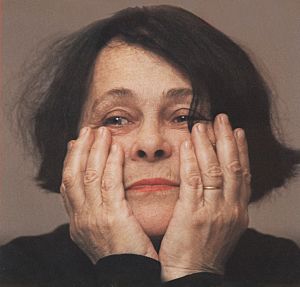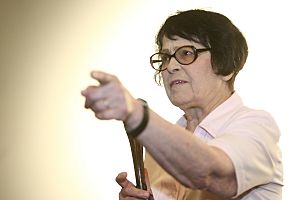Kira Muratova facts for kids
Quick facts for kids
Kira Muratova
People's Artist of Ukraine
|
|
|---|---|
| Romanian: Kira Gueórguievna Muratova | |

Kira Muratova in 2006
|
|
| Born |
Kira Gueórguievna Korotkova
5 November 1934 |
| Died | 6 June 2018 (aged 83) |
| Occupation | Film director Screenwriter Actress |
| Years active | 1961–2018 |
| Spouse(s) | Oleksandr Muratov Evgeny Golubenko |
Kira Georgievna Muratova (Russian: Кира Георгиевна Муратова; Romanian: Kira Gueórguievna Muratova; Ukrainian: Кіра Георгіївна Мура́това; born Korotkova, 5 November 1934 – 6 June 2018) was an award-winning Ukrainian film director, screenwriter, and actress. She was known for her very unique style of filmmaking.
Kira Muratova's films often faced censorship in the Soviet Union. Despite these challenges, she became one of the most important figures in modern Cinema of Ukraine and Russian cinema. She built a successful film career starting in the 1960s. She was named a People's Artist of Ukraine in 1989. She also became an Academician of the National Academy of Arts of Ukraine in 1997.
Muratova received the Shevchenko National Prize in 1993 and the Oleksandr Dovzhenko State Prize in 2002. She spent most of her career in Odessa, making many of her films at the Odesa Film Studios. Her work is seen as one of the most special and distinct in the world of cinema.
Contents
Kira Muratova: A Unique Film Director
Early Life and Film Journey
Kira Korotkova was born in 1934 in Soroca, which was then part of Romania. Today, this city is in Moldova. Her father was Russian, and her mother was Romanian with Jewish heritage. Both of her parents were active members of the Communist Party.
Her father, Gheorghe Corotcov, fought against fascism in World War II. He was captured by Romanian forces and sadly died after being questioned. After the war, Kira lived in Bucharest with her mother, Natalia Corotcov-Scurtu. Her mother was a gynecologist who later worked in the government of Socialist Romania.
In 1959, Kira finished her studies at the Gerasimov Institute of Cinematography in Moscow. She specialized in directing films. After graduating, Korotkova started working as a director at the Odessa Film Studio in Odessa. This is a port city on the Black Sea, close to where she grew up.
Facing Challenges and Finding Her Voice
Kira directed her first professional film in 1961. She worked at the Odessa studio until 1978, when a disagreement led her to move to Leningrad. There, she made one film with Lenfilm Studio. However, she soon returned to Odessa.
Muratova's films were often criticized by Soviet officials. This was because her unique style did not fit the rules of socialist realism, which was the official art style. Film experts have compared her filmmaking style to early Soviet Avant-garde art. Because of these issues, Muratova was sometimes banned from working as a director for several years at a time.
Kira married Oleksandr Muratov, who was also a director at the Odessa studio, in the early 1960s. They worked together on a few films. They had a daughter named Marianna, but they later divorced. Oleksandr moved to Kyiv. Kira Muratova kept his last name, even after she married Evgeny Golubenko, a painter from Leningrad.
A Productive Period and Unique Style
The 1990s were a very busy time for Muratova. She made a new feature film every two or three years. She often worked with the same actors and film crew. Some of her films from this time include The Sentimental Policeman (1992), Passions (1994), and Three Stories (1997). She also made a short film in 1999 called Letter to America.
Two actresses she often cast were Renata Litvinova and Natalya Buzko. Muratova's films were usually made in Ukraine or were co-productions between Ukraine and Russia. They were always in the Russian language. Muratova could speak Ukrainian and supported the use of Ukrainian in films. She also supported the Euromaidan protests in 2014.
Muratova's films were shown at major International Film Festivals. These included festivals in Berlin (1990, 1997), Cannes, Moscow, Rome, and Venice. Her work is known for being very unique. Her films often use different styles, humor, and strong visuals and sounds. They explore ideas in a way that makes you think.
Awards and Recognition
Kira Muratova started to receive widespread public recognition and her first awards during the period of Perestroika in the Soviet Union. In 1988, the International Women's Film Festival in Créteil, France, showed a special collection of her films. Her movie Among Grey Stones was shown at the 1988 Cannes Film Festival.
In 1990, her film Asthenic Syndrome won the Silver Bear Jury Grand Prix at the Berlinale. In 1994, she received the Leopard of Honour for her lifetime achievements at The Locarno International Film Festival in Switzerland. In 2000, she was given the Andrzej Wajda Freedom Award. Her film Three Stories was part of the 47th Berlin International Film Festival in 1997.
Her 2002 film Chekhov's Motifs was shown at the 24th Moscow International Film Festival. Her film The Tuner was presented at the Venice Film Festival in 2004. Her films won the Russian "Nika" prize multiple times: in 1991, 1995, 2005, 2007, 2009, and 2013. In 2005, a special showing of her films was held at the Lincoln Center in New York City. In 2013, all of her films were shown at the International Film Festival Rotterdam.
She also received several important national honors:
- Order of Prince Yaroslav the Wise
- Order of Friendship
- People's Artist of Ukraine
- 1993 Shevchenko National Prize
Filmography
| Year | Title (Original) | Title (English) | Director | Writer | Actress | Notes |
|---|---|---|---|---|---|---|
| 1961 | У Крутого Яра | By the Steep Ravine | Yes | Yes | With Aleksandr Muratov | |
| 1964 | Наш честный хлеб | Our Honest Bread | Yes | as Agapa | With Aleksandr Muratov | |
| 1967 | Короткие встречи | Brief Encounters | Yes | Yes | as Valentina Ivanovna | |
| 1971 | Долгие проводы | The Long Farewell | Yes | |||
| 1972 | Россия | Russia | Documentary; with Theodore Holcomb | |||
| 1978 | Познавая белый свет | Getting to Know the Big, Wide World | Yes | Yes | ||
| 1983 | Среди серых камней | Among Grey Stones | Yes | Muratova did not approve of this version after changes were made due to political censorship. It was credited to "Ivan Sidorov." | ||
| 1987 | Перемена участи | Change of Fate | Yes | Yes | ||
| 1989 | Астенический синдром | The Asthenic Syndrome | Yes | Yes | ||
| 1992 | Чувствительный милиционер | The Sentimental Policeman | Yes | Yes | ||
| 1994 | Увлеченья | Passions | Yes | |||
| 1997 | Три истории | Three Stories | Yes | |||
| 1999 | Письмо в Америку | Letter to America | Yes | Short film | ||
| 2001 | Второстепенные люди | Minor People | Yes | Yes | ||
| 2002 | Чеховские мотивы | Chekhov's Motifs | Yes | Yes | ||
| 2004 | Настройщик | The Tuner | Yes | Yes | ||
| 2005 | Справка | Certification | Yes | Short film | ||
| 2006 | Кукла | Dummy | Yes | Short film | ||
| 2007 | Два в одном | Two in One | Yes | |||
| 2009 | Мелодия для шарманки | Melody for a Street-organ | Yes | Yes | ||
| 2012 | Вечное возвращение | Eternal Return | Yes | Yes |
See also
 In Spanish: Kira Murátova para niños
In Spanish: Kira Murátova para niños
- List of female directors
- Women's cinema
- Cinema of Ukraine
 | Shirley Ann Jackson |
 | Garett Morgan |
 | J. Ernest Wilkins Jr. |
 | Elijah McCoy |


